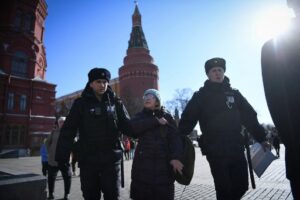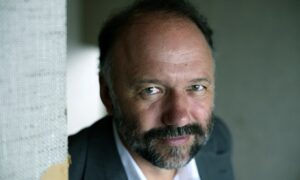You never know who you might find yourself next to on a train or plane. I left Ukraine for a week and travelled to England to raise money for refugees. While traveling by rail from the airport to London, I noticed a Slavic woman sitting next to me. When the train started moving, I took out my computer and began to write an article. I was writing in Russian and noticed how the woman was looking at my screen, reading the Cyrillic letters. She immediately asked where I was from.
I told her I was from Ukraine. It turned out that she was from Russia, specifically Moscow. But she had been living in Europe for a long time and had no plans to go back.
“Do you know how Russia is supporting Ukraine these days?” she asked a little pompously.
“How?” I asked, trying to sound genuinely interested. I do not believe in any kind of Russian support.
“Activists have covered the whole of Russia with green ribbons!” she said.
“Green?” I was surprised. “What does that mean?”
“It means that Russians support Ukraine!” she exclaimed, clearly expecting me to be thrilled.
I was puzzled and tried to figure out what green ribbons could have to do with my country. Various possibilities came to mind
Could it be a sign of respect for President Zelensky? In Ukrainian, the name Zelensky is related to the word for the color green. The corporate color of Zelensky’s “Servant Of The People” party is also green.
Without waiting for me to express my enthusiasm for this green “movement’, the woman explained: “If you mix the colors of the Ukrainian flag into one, if you take yellow paint and mix it with blue, you get green!”
Why mix the colors? I asked. “Wouldn’t it be better to just hang yellow and blue ribbons!”
“No, that won’t work! Everyone will be arrested!” she explained.
“So, it’s some kind of secret protest?” I asked. “Nobody will understand it! People will assume it’s something to do with protecting the environment!”
“No, we explain about it!” the woman retorted determinedly. “We post on Facebook!”
“But there’s no access to Facebook in Russia, or Twitter, or Instagram, or YouTube!”
“We post it on Facebook here!”
“In England?”
“Yes! But the ribbons are hung in Russia.”
Having arrived at Liverpool Street Station in London, and whilst transferring to the subway, I kept thinking about these secret Russian protests against the war in Ukraine. And an amazing thought struck me. I realized that today’s Russia is much more intimidated by the powers-that-be than Soviet people were during the later years of the Soviet Union when I was growing up.
Today, Russians who are against the regime leave the country. Very few people could leave the USSR, but underground movements of all kinds existed, flowing just below the surface of society. Although it was very dangerous to be associated with any of these movements, plenty of people joined up. They gathered around kitchen tables, copied out texts, listened to banned radio stations and “anti-Soviet” music and poetry, and, of course, wrote unsanctioned literature.
It was courageous, but I wonder whether those people felt they had any choice but to join these informal movements. It was the way they maintained their humanity, or at least their sanity. In today’s Russia, freedom of expression comes last on the list of people’s priorities. They don’t want to lose their quality of life and they don’t want to risk their stability. But some are still ashamed to remain silent when, in their name, crimes are being committed in Ukraine.

Russian Police officers detain an elderly woman as she protests against Russia’s ongoing invasion of Ukraine, in central Moscow on March 20, 2022. (Photo by AFP)
For peace of mind, perhaps, they do look for opportunities to secretly protest against Putin’s regime, but so secretly that the regime does not notice their protests and does not force them to pay heavy fines or otherwise punish them. Green Ribbons Against the War in Ukraine is one such covert stand that allows protesters to feel that they are showing courage and to sleep peacefully at night while Russian bombers destroy Ukrainian towns and villages.

Andrei Kurkov is the author of over 30 books. His novels are translated in 37 languages, including English, Japanese and Hebrew! He is President of PEN Ukraine. He has published articles and essays in Ukraine in media around the world, including The Guardian, Die Wielt. Andrei Kurkov also did media projects for EBRD in Ukraine. He resides in Kyiv. (Courtesy photo )
